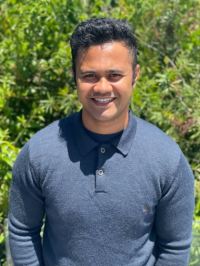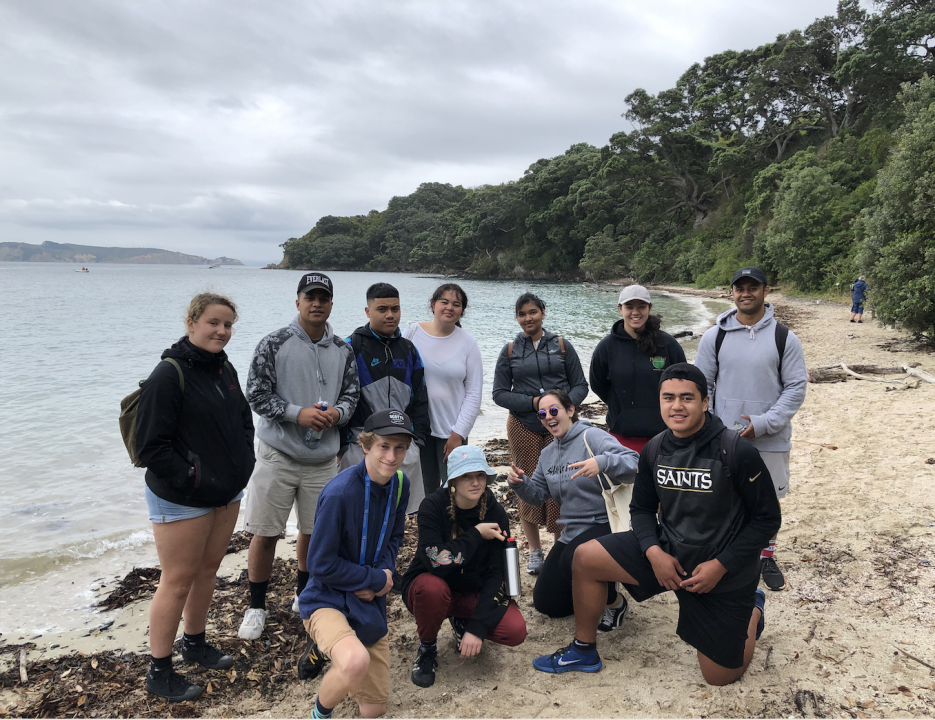Developing highly functional and tailorable surface coatings
22 February, 2022
New MacDiarmid Institute Associate Investigator Dr Taniela Lolohea says that in his first year of university STEM study, he was part of a cohort of 40-50 Māori and Pasifika students.
“But this quickly changed. By the end of my 3rd year there were only a handful of us. And from Honours onwards, it was just me.”
“You look around and there’s no one else like me.”
Now a lecturer in Chemistry at Auckland University of Technology (AUT), Dr Lolohea says these experiences are behind his work to try and motivate younger generation of Māori and Pasifika students into the STEM fields.

New Associate Investigator, Dr Taniela Lolohea
So how far behind is the next Pasifika STEM student?
“It’s hard to find even Honours Pasifika students with STEM backgrounds – so they’re some years behind. It’s hard to get them to see academia as a fruitful pathway. Often the organisations are saying all the right things in their Terms of Agreement documents, but whether it’s fruitful or just words is hard to say.
“This has been weighing on my mind a lot lately. It looks like movement but feels like words till things happen."
It’s like inviting people to your house – it’s not great if your house isn’t ready to take on guests.
Dr Taniela Lolohea Associate Investigator
“It’s like inviting people to your house – it’s not great if your house isn’t ready to take on guests. Similarly how can I genuinely say to Māori and Pasifika students that science is cool and expect them to come all bright eyed, when the reality is harsher and they’re going to face turmoil."
“So my thought at the moment – is it better for me to prepare the ‘home’ before I invite them? When I speak with them, I tend to give a realistic view of things – and explain that it’s not always nice and people are not always welcoming. In my culture, people respect a more honest view of things.”
So how do we help Māori and Pasifika students to see academia as a fruitful pathway?
“We want to show role models, trail blazers leading the way. As a student you want to trust that your supervisor knows your background."
Dr Lolohea was born in Rotorua to Tongan parents who came to NZ in the 80s. The middle child of five siblings - four sisters and one brother, he says he’s passionate to change things for others in his community.
His own research spans two disciplines. Plasma jet printing, and Pasifika knowledge systems.
Dr Lolohea says the Plasma jet printing work follows from his PhD and postdoctoral research.
“Plasma jet is a reactive medium, with free electrons and ionised gas particles. When you inject material into this plasma you get what we call ‘interactive species’ – so a mist of tiny droplets that interact with the plasma in ways that lead towards highly functional and tailorable surface coatings. If you can control the chemistry you can create specific surface coatings fit for purpose, smoother or rougher, more porous or more dense.”
He says there are many potential real-world applications ahead.
“You can deposit coatings onto surfaces - for example onto plastic for self-cleaning windows or as anticorrosive coatings for metals, or for use in gas sensors.”
He says his natural links in the Institute are with his MacDiarmid colleagues at the University of Auckland; Principal Investigators Professors Duncan McGillivray, and David Williams, Associate Professor Geoff Willmott, and Professor Jadranka Travas Sejdic, and Associate Investigator Dr Viji Sarojini.
The collaborations extend to bioprinting, and fit within the Institute’s new ‘Towards Zero Waste - Reconfigurable Systems’ research programme.
“We’re heading in the direction of bioprinting, with a high material-to-coating efficiency. We’re wanting to get to the position where the hi-tech application of biomaterials and coatings will be environmentally benign and having good cost-benefit ratios.”
If you can control the chemistry you can create specific surface coatings fit for purpose.
Dr Taniela Lolohea Associate Investigator
His second area of research aims to shed more light on Pasifika science knowledge systems. He says the work is multidisciplinary, and not yet well defined.
“Too often Māori and Pasifika knowledge systems are lumped together. They face similar hardships but the journey should be from individual aspects cause they’re coming from different backgrounds.”
He says this is a really new space for NZ.

Dr Lolohea (back, right) and students at the annual MacDiarmid Institute DiscoveryCamp
“I’m setting up my own network with other Pasifika researchers, in areas including public health, education and sciences, providing me with guidance and support around this work of intwining qualitative methodologies into a space like science and engineering. It’s research is grounded in the community, and stems from my own culture and background, it’s attached to the people and communities which is where research is most impactful. You can’t just throw numbers at it. It has to be for the people, by the people.
“Talanoa is a widely used methodology and is known to have different formats, structures and settings depending on the context it is applied to. This is something I would like to see more of in science, is a mixed methodologies approach which connects our research to the community, and the community to our research.”
Dr Lolohea is using some of his MacDiarmid funding for Pasifika science projects – working to have these ready to offer to students.
“I’m designing 4-5 projects that will be ready to go when the right student comes along.”
He says AUT has been doing a good job in the last five years with the Eke Tangaroa Programme.
“And it’s really encouraging to have Damon Salesa as our new VC. This definitely influences how I see my long term stay at AUT. (AUT announced in November that Pacific Scholar, Associate Professor Damon Salesa will move from Pro-VC Pacific at the University of Auckland to the AUT top job early in 2022.).
I’m passionate about changing the landscape
Dr Taniela Lolohea Associate Investigator
As an undergraduate student Dr Lolohea joined the Tuākana network at the University of Auckland.
“That was cool. I bugged the guy that ran it to let me be a mentor by my 3rd year, and then ended up coordinating the Tuākana Chemistry programme by the end of my PhD. I’m passionate about changing the landscape and helping the Māori and Pasifika cohort. I’m really wanting to address some of the inequities we’re seeing in Institutions.
“There are lots of people trying to make change, so it won’t be long.”


